A dedicated team of 10 volunteers from R4GM’s waste disposal partner, SUEZ recycling and recovery UK, planted an impressive 210 native trees in Rochdale in December, working in partnership with the Community Forest for Greater Manchester, City of Trees.
The trees were planted on a green space near the Healey Foundation Primary School on Tuesday 2nd December.
Each year, SUEZ has committed to planting 200 trees in Greater Manchester as part of their social value commitments. This latest effort means that they have now planted over 1,700 trees across since 2019.
The 210 newly planted trees will play a crucial role in improving nature, enhancing the local environment and supporting habitats for local wildlife. Trees are a vital natural solution, helping to absorb carbon dioxide, improve air quality, and manage surface water run-off.
SUEZ worked closely with City of Trees, an organisation dedicated to planting, protecting, and promoting trees across the region, to ensure the right native species were selected and planted in the optimal location for long-term survival and ecological benefit.
Karen Thompson, Partnership and Community Engagement Manager for SUEZ in Greater Manchester said: “It was incredibly rewarding to spend the day outside and see the difference we could make in just a few hours. Knowing these 210 trees will grow and contribute to a healthier Greater Manchester is a fantastic feeling.”
“This tree-planting event is a clear example of our commitment to delivering our social value promises in the region. We are immensely proud of our team for smashing their annual target and contributing over 1,700 trees to the local landscape since 2019.”
As part of the Greater Manchester Combined Authority (GMCA) waste contracts, SUEZ operate the recycling centre at Chichester Street as well as the other 19 centres. They also process the waste and recycling from collected from households from 9 out of the 10 councils across Greater Manchester. This tree-planting initiative is part of SUEZ’s ongoing strategy to deliver environmental and social benefits across the Greater Manchester area.
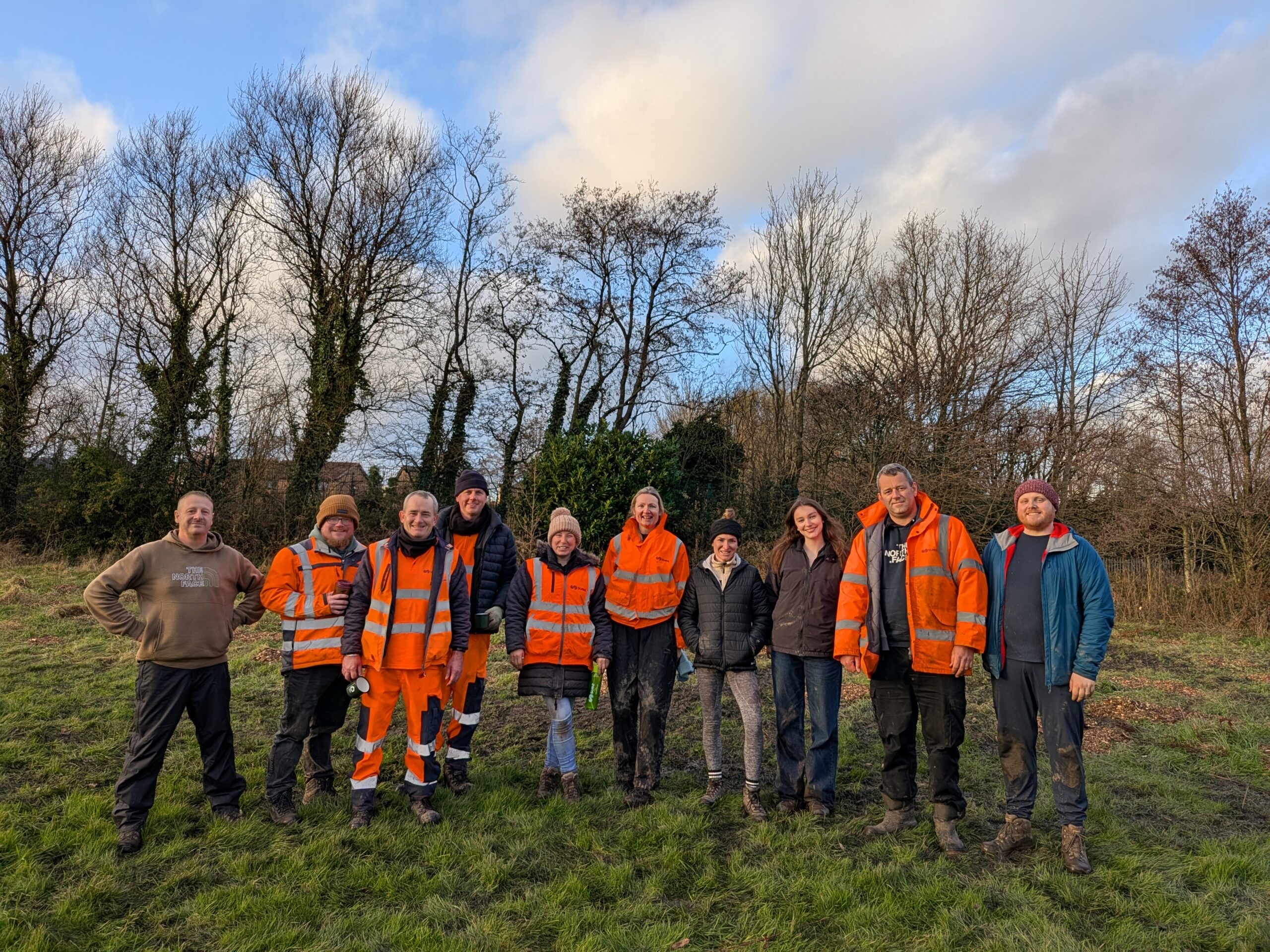
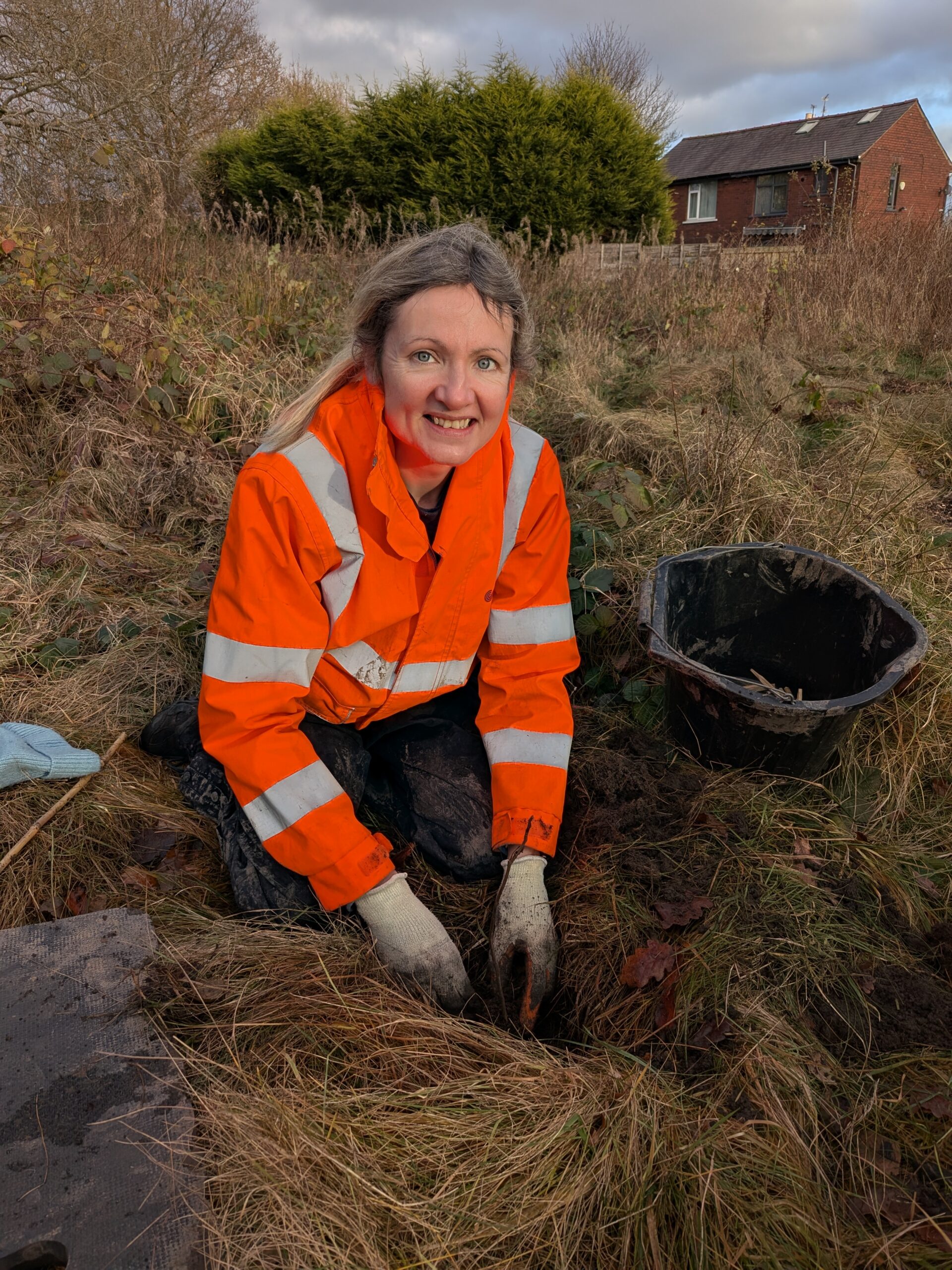
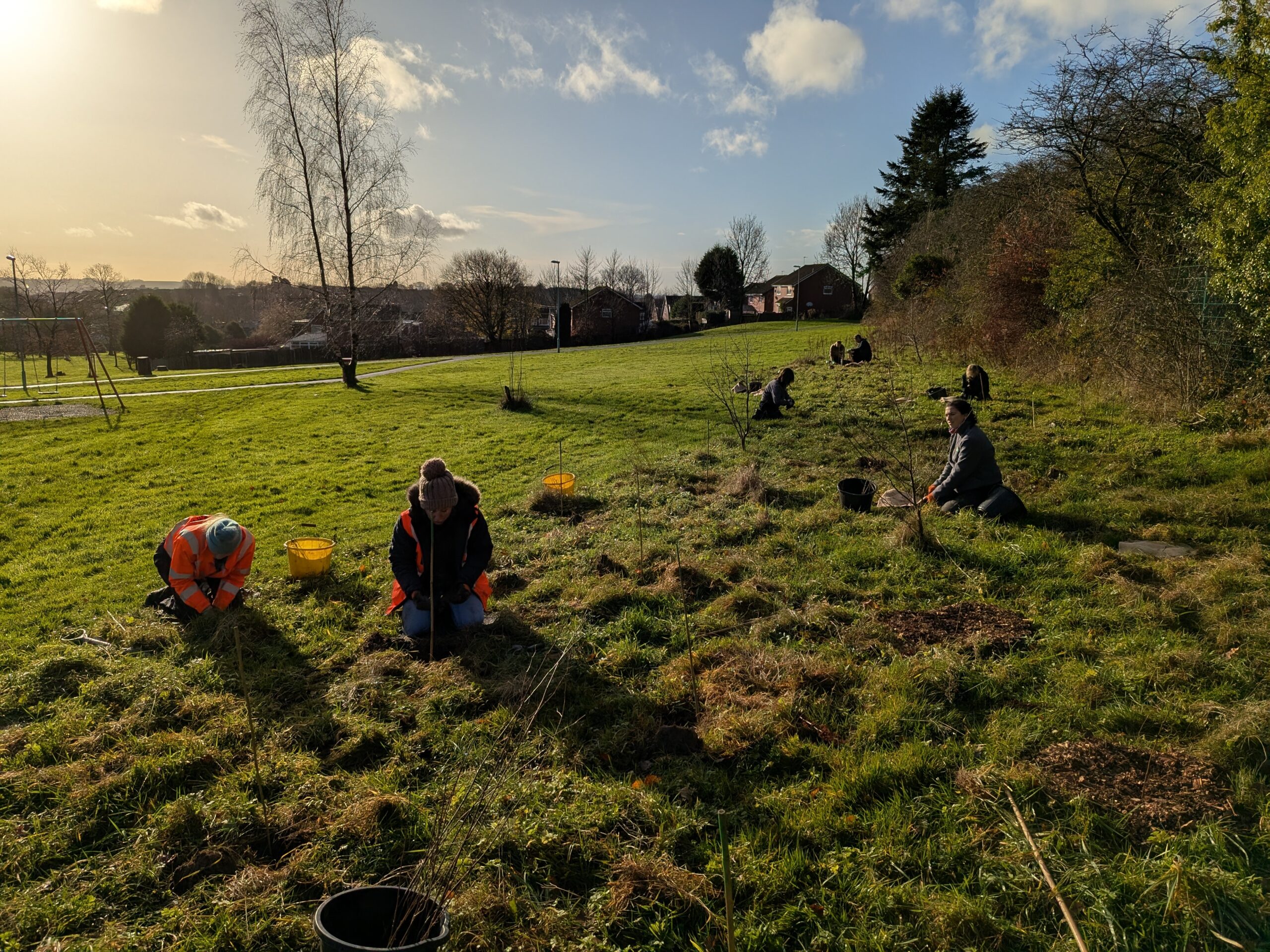
Polly, the Morticia of recycling, tells us how she stays spooky and sustainable at Halloween:
Halloween is my favourite time of the year. I love any reason to get dressed up and to make my house look spooky!
But as someone that cares about the environment, I hate to see all the single-use items we use once and then bin. So, this year I’ve challenged myself to waste less. Here’s how I got into a Hallo-green mindset.
Decorations:
The shops are full of cheap decorations that I’m desperate to buy to spookify my house. But not this year. Instead, I’ve invested in quality spooks and got crafty to make them last longer.
I’ve also done some upcycling to make stuff last longer. I’ve strengthened some flimsy polystyrene gravestones with bamboo sticks. Making them windproof, they’ve now lasted three years. Much better than replacing them every year!
Battery- powered lights and decorations are great, but they don’t always last more than a single year. Instead of buying new, I get a handy screwdriver and replace the batteries to make my decorations last longer.
Pumpkins:
I love pumpkins. They come in so many different colours, shapes and sizes. And that’s why I hate that so many of them are wasted. Over the years I’ve found recipes ranging from cakes and pies, to curries, risotto and even pumpkin macaroni cheese.
Pumpkins are so versatile and you can mix them with a whole range of spices and have your own October feast.
Here are some of my favourite recipes:
Pumpkin Macaroni Cheese Recipe – Great British Chefs
Pumpkin risotto with hazelnut butter – easy dinner recipe
Pumpkin cake recipe | Good Food
Easy Pumpkin Pie Recipe
Pumpkin Soup – RecipeTin Eats
Top tip: October brings rainy, dark days and I like to use pumpkins to keep my daughter busy. Using water-based paint, we decorate them early in the month. When I’m ready to cook, I give them a good wash and cook them. Please make sure you scrub off all the paint, water-based paint is considered non-toxic but it’s not worth taking any risks when it comes to cooking them!
When we’re ready to carve our spooky pumpkins, I make them with big eyes, a wide mouth and use the scraps to make pumpkin puree. These make delicious cookies. I roast the seeds with sugar and cinnamon and add them to my cookie mix.
Remember that any parts of the pumpkin you don’t eat can be recycled in your food and garden bin where it will be turned into compost right here in the North West.
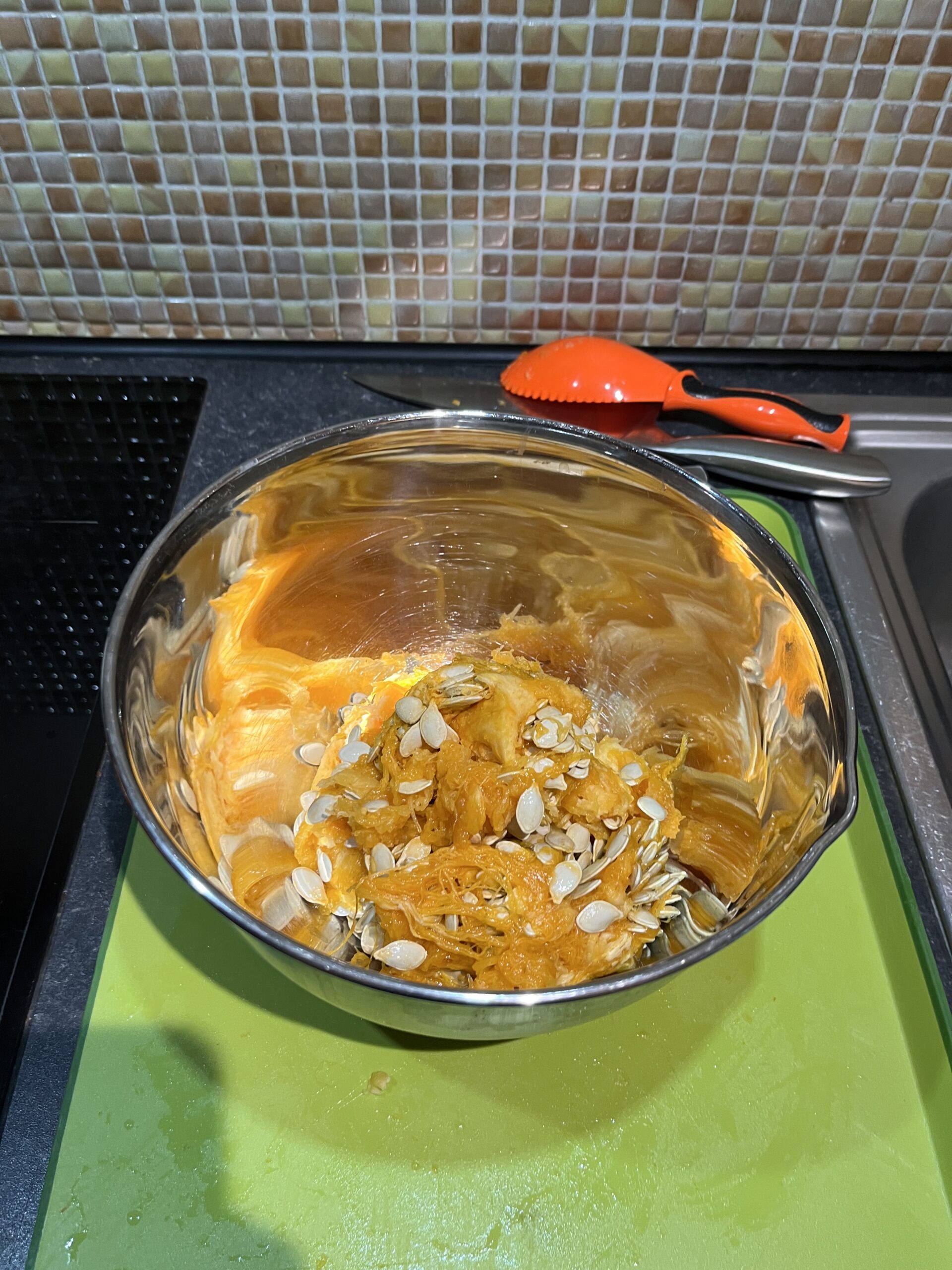
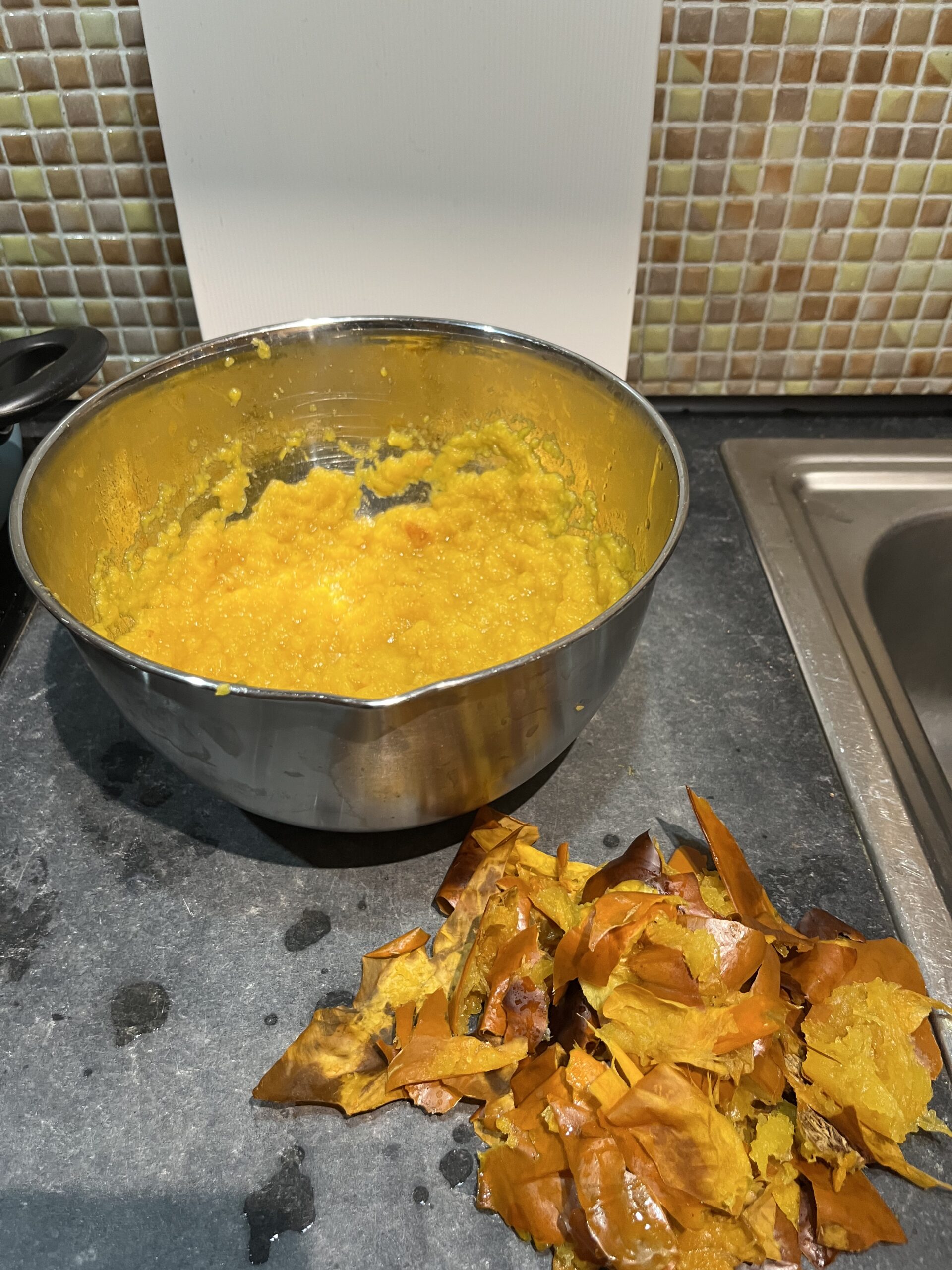
Sweets:
Trick-or-treat is a must in our household and I start stockpiling sweets from the beginning of October. Recently I’ve noticed that sweets come with more plastic than ever. You can’t recycle plastic sweet wrappers at home, but you can take them to a soft plastic collection point in supermarkets. I collect all mine in a bread bag and take it when it’s full. Even eating sweets can be guilt free!
Talking of sweets, last year my daughter collected two whole bags of them. Trying to be conscious of the amount of sweets a little one should have, I did my maternal duty of eating as many as I could … but this year, I’m making my own ice cream using gummies, brownies using chocolates and hopefully many more treats to take on our Sunday picnics.
Costumes:
Since becoming a mum, Halloween costumes have become a cute tradition. But with growth spurs and fashion trends, they are becoming an expensive trend. This year like many households, we’ve been singing and dancing to the K-Pop Demon Hunters soundtrack non-stop, and it was no surprise when my daughter said she wanted to dress up as one of the Hunt/X.
I set myself a challenge – could I create this ‘golden outfit’ from second-hand clothes in charity shops. Sourcing the shorts was a difficult task in autumn but somehow we managed to get them, plus a t-shirt and leather jacket in my local shops. We added some necklaces and the result, in my daughters words was “I will look so awesome, I’m gonna be Golden!” The great thing about it is that after Halloween, I can sell the clothes on vinted!
Halloween doesn’t need to cost your pocket, or the planet, if you make the right decisions. If you make your own decorations and costumes, you can have a great fun family fuelled month.
– A SUEZ recycling and recovery UK lorry carrying paper and cardboard to be recycled went up in flames on Monday, September 1
– The fire was caused by an item with a battery thrown away in a household bin
– Residents reminded to ‘Be Battery Aware’ as fires involving batteries continue to increase
– Always recycle batteries and items containing batteries at a retailer take back scheme or recycling centres
Greater Manchester Fire and Rescue Service (GMFRS) and Recycle for Greater Manchester (R4GM) are urging residents to take care when disposing of items containing batteries after a lorry caught fire last week.
The lorry operated by GMCA’s waste contractor SUEZ was travelling from Longley Lane waste processing facility in Wythenshawe to a paper and card recycling facility in Partington when the large quantity of paper and cardboard it was carrying burst into flames around 8pm on Monday, September 1.
GMFRS quickly arrived on the scene and spent five hours extinguishing the fire using specialist equipment, saving the lorry trailer. Thankfully nobody was injured during the incident.
A subsequent investigation found that the fire had been caused by a lithium-ion battery, likely found in a vape or small electrical item which had incorrectly been put in a paper recycling bin.
Whilst the quick action of firefighters ensured the lorry was saved in this instance, the outcome could have been much worse. A discarded battery can ignite in the back of a bin lorry or at a waste or recycling facility posing a significant risk of damage to vehicles, machinery, and infrastructure. An incident of this nature on a major road could also cause severe traffic disruption.
The number of fires in Greater Manchester caused by batteries has increased in recent years, with 195 reported over 2022/2023 compared to 271 over 2024/2025, a 39% increase.
In addition, 2024-25 saw 14 incidents involving disposed batteries in Greater Manchester, compared to a total of 13 incidents across the two years prior. This increase shows no sign of slowing down this year so far, with 7 incidents recorded already since 1 April 2025. In the UK, 1.6bn batteries were thrown away in the last year, over 3,000 a minute.
Area Manager Billy Fenwick, GMFRS’ Head of Prevention, said:
“It is vitally important that we correctly dispose of batteries and items containing batteries like vapes, because the consequences can be devastating if we don’t.
“We work alongside R4GM to alert people to the dangers of improper disposal and inform them of where they can discard their batteries safely.
“Batteries can be found in a lot of our everyday items so please follow the advice and be extra careful when disposing of batteries.”
Cllr Tom Ross, Greater Manchester lead for Waste and Recycling said:
“The recent fire in the SUEZ vehicle is a stark reminder of the dangers that batteries pose when they are not disposed of correctly. This incident highlights the significant risks to the public and to the staff running the waste site.”
“We urge all residents to be ‘Battery Aware’ and to follow the guidance to recycle batteries at designated points. Placing batteries in household bins, including recycling, can have serious consequences and is a risk we all need to take seriously.”
All batteries, including lithium-ion batteries found in vapes, need to be disposed of at household waste recycling centres or recycling points found at supermarkets, shops, or workplaces.
GMFRS and R4GM run the ‘Be Battery Aware’ campaign with the aim of reducing the number of battery related incidents across the city-region.
There are some simple steps you can take to ensure that you dispose of batteries, and items containing batteries, safely:
– Dispose of batteries and items containing batteries at household waste recycling centres or recycling points at electrical retailers.
– Do not put old batteries or electrical items in any of your household bins, including recycling bins
– Anything with a plug, cable or battery can be recycled. Find your nearest recycling point https://www.recycleyourelectricals.org.uk/
– Check items for hidden batteries and remove them before recycling, if you can’t remove them, place the electrical item including the battery in the electrical recycling container at a retailer or recycling centre
– Return vapes to where you bought them as retailers are obligated to provide a take-back scheme
For further information please contact the Communications and Engagement team on: news@greatermanchester-ca.gov.uk.
Renew celebrates four years and millions of pounds transforming local waste into community good.
Renew has donated £1.6 million directly to community groups and charities across Greater Manchester in the last four years.
Renew is a joint initiative between Recycle for Greater Manchester (R4GM) and SUEZ recycling and recovery UK and is the largest reuse and repair project of its kind in the country.
Greater Manchester’s unique reuse and repair initiative, Renew, has marked four years of delivering social and community impact across the city-region. Renew is at the heart of GMCA and SUEZ’s waste and resources contact commitment to deliver world leading social value.
Since its inception, the Renew programme has been instrumental in diverting hundreds of thousands of reusable items from waste while funding community groups and donating large sums to Voluntary, Community, Faith and Social Enterprise groups.
Renew is a joint initiative between R4GM and SUEZ recycling and recovery UK and is the only reuse and repair project of its kind in the country. Money from the sales of repaired and upcycled goods are channeled back into the Renew Community Fund, which has awarded a total of £1.1m to 110 local projects since 2021. These projects have been pivotal in encouraging residents to recycle, fix, mend, borrow, and share items, promoting a circular economy and generating wider social benefits.
Emmaus Salford – a charity which helps people who have been homeless – is also supported by the community fund with their house clearance project: repairing, reusing and recycling furniture, clothes, bikes and books. This project reduces waste, offers training and employment to homeless people, and supports our wider community by providing volunteering opportunities and low-cost essential items to those in need.
Emmaus were awarded nearly £10,000 from the fund which allowed them to hire a van driver who could help transport unwanted items to be repaired and sold in their shops. This key role meant the organisation could improve their capacity to work across Salford, transporting bulky items and speeding up the clearance process.
The Rochdale Science Initiative was awarded £20,000 to continue to their work in involving the wider community in science. They ran hands on workshops themed around recycling and repair, providing food recycling advice and held sewing workshops to teach basic clothing repairs. The year long project culminated in an event bringing together climate action with STEM.
Alongside this a total of £500,000 has been donated to the Greater Manchester Mayor’s Charity to support their day-to-day work including the pioneering A Bed Every Night scheme, a commitment to provide a bed, welcome, hot meal and support for anyone sleeping rough in Greater Manchester.
Renew has also:
Donated upcycled and repaired equipment to local communities in need by redistributing unwanted kitchen equipment to people experiencing homelessness or in crisis.
Supported the rehabilitation of offenders through helping prisoners learn new skills such as repairing bikes and other household items, plus skills in furniture restoration and upcycling. Organisations like Recycling Lives have helped 20 ex-offenders move into full-time employment, with 13 securing jobs at SUEZ. The social value approach to waste management is helping to support local neighbourhoods and provide much needed funding for VSCFE organisations helping to tackle social and economic inequalities to enable everyone to live well.
On Wednesday (September 3) the Mayor visited the Renew Hub in Trafford Park to meet community groups who have benefited from the Community Fund, and the skilled repairer and upcyclers, including apprentices.
Andy Burnham, said:
“It was inspiring to watch the repair experts at the Renew Hub breathe new life into furniture and bikes knowing that these items would have been thrown away in the past. Now they’re being sold to raise money for our VCFSE sector which plays such a foundational role in people’s day-to-day lives.
“And it’s also supporting jobs and apprenticeships in the repair sector as well as providing affordable household items at their shops.”
John Scanlon, Chief Executive Officer of SUEZ UK said:
“When we fix something, borrow something instead of buying it, or buy second-hand instead of new, we’re keeping these items in use and saving precious resources. Renew has been at the forefront of this movement for four years, and we’re incredibly proud of what they’ve accomplished. Their efforts have not only kept countless items from going to waste but have also created tangible benefits across Greater Manchester.”
Greater Manchester residents can help support Renew by donating items at their local recycling centres and by shopping at the Renew shops in Oldham, Salford and Altrincham.

Visit one of our three Renew Shops to grab yourself a pre-loved bargain… Once it’s gone, it’s gone!
VIEW MORE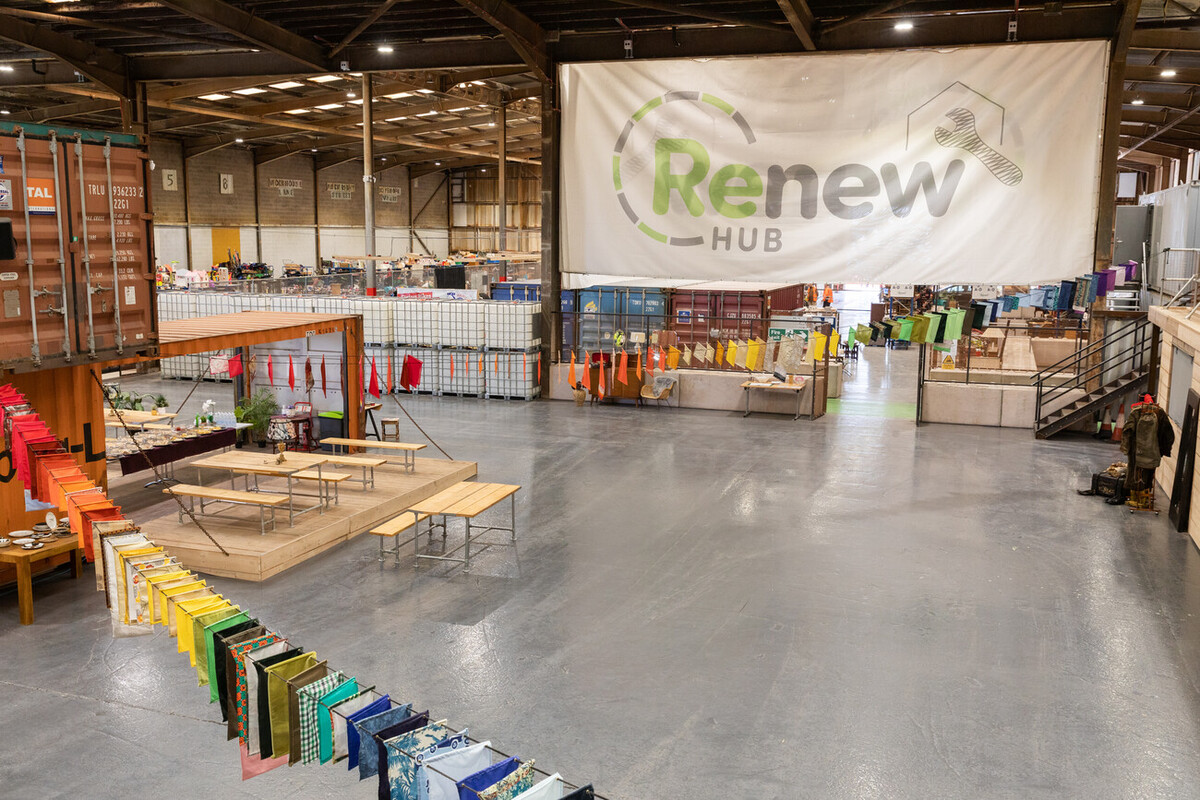
The UK’s largest reuse facility, where we upcycle, fix, and refurbish items donated at Recycling Centres.
VIEW MORE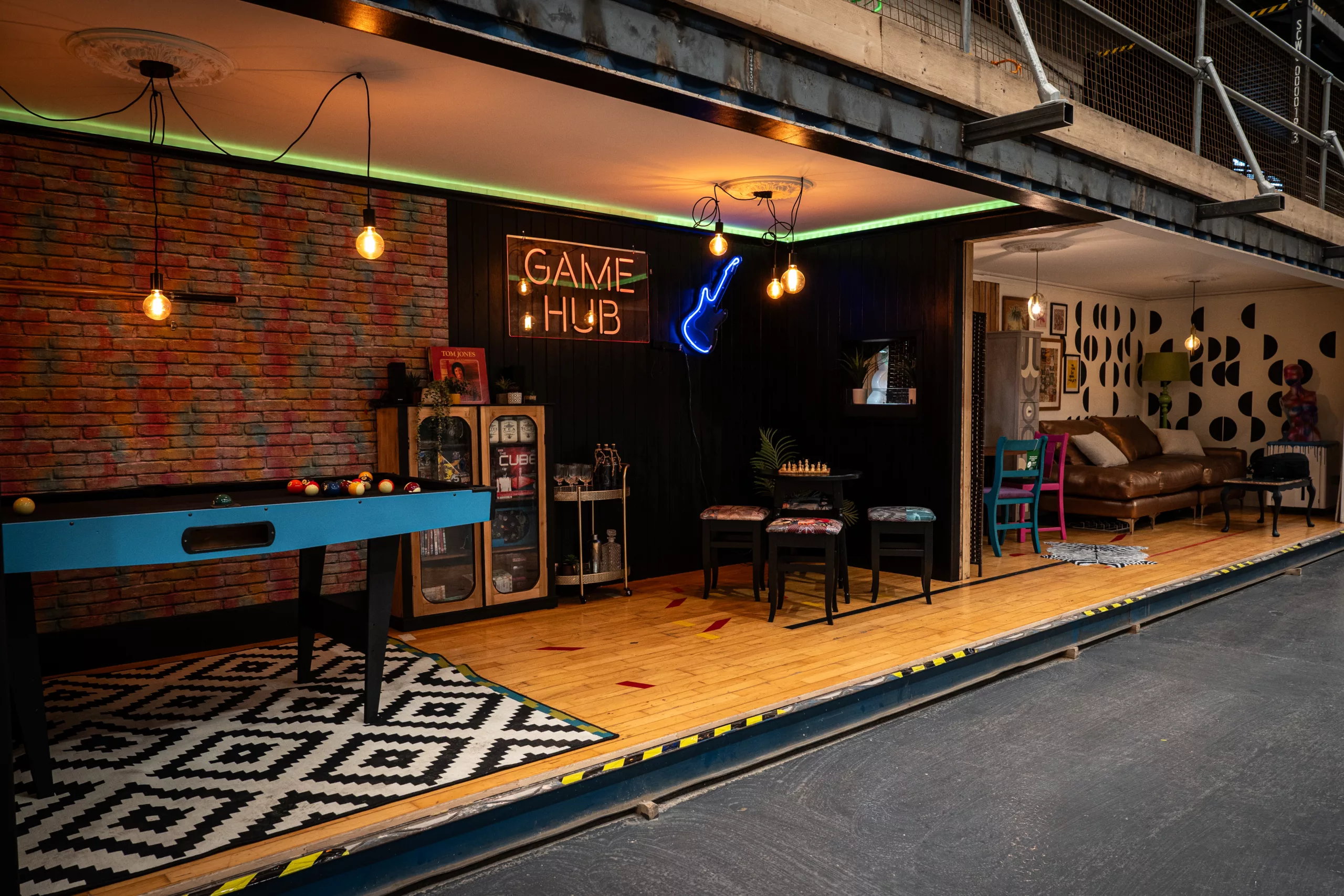
Browse our wide range of affordable pre-loved and renewed items via our online shop or ebay page.
SHOP NOW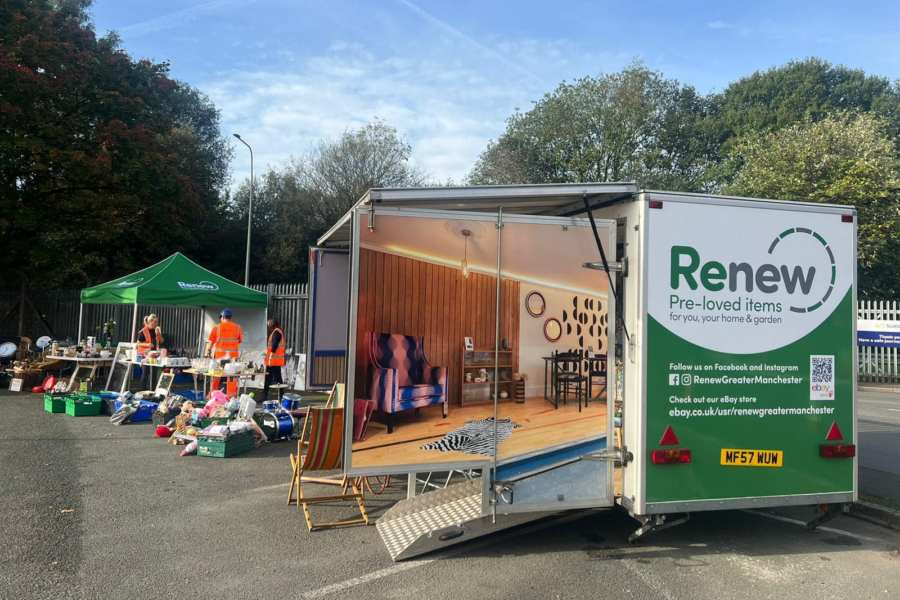
We hold special Renew pop-up shops across Greater Manchester, bringing vintage and pre-loved bargains closer to home.
MORE INFO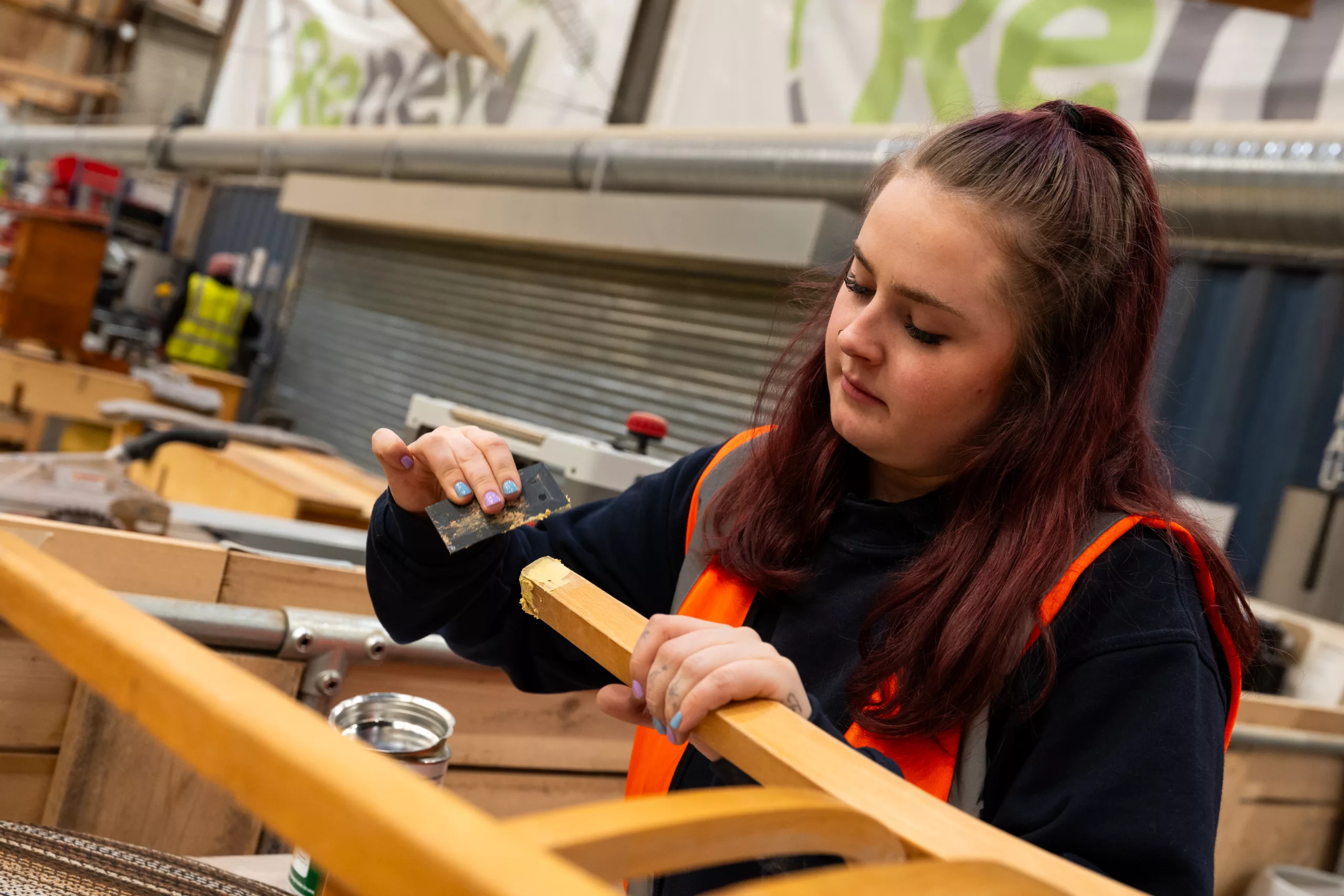
Interested in upcycling? Looking to gain new upholstery skills? Learn from experts with workshops at Renew Hub in Trafford!
MORE INFO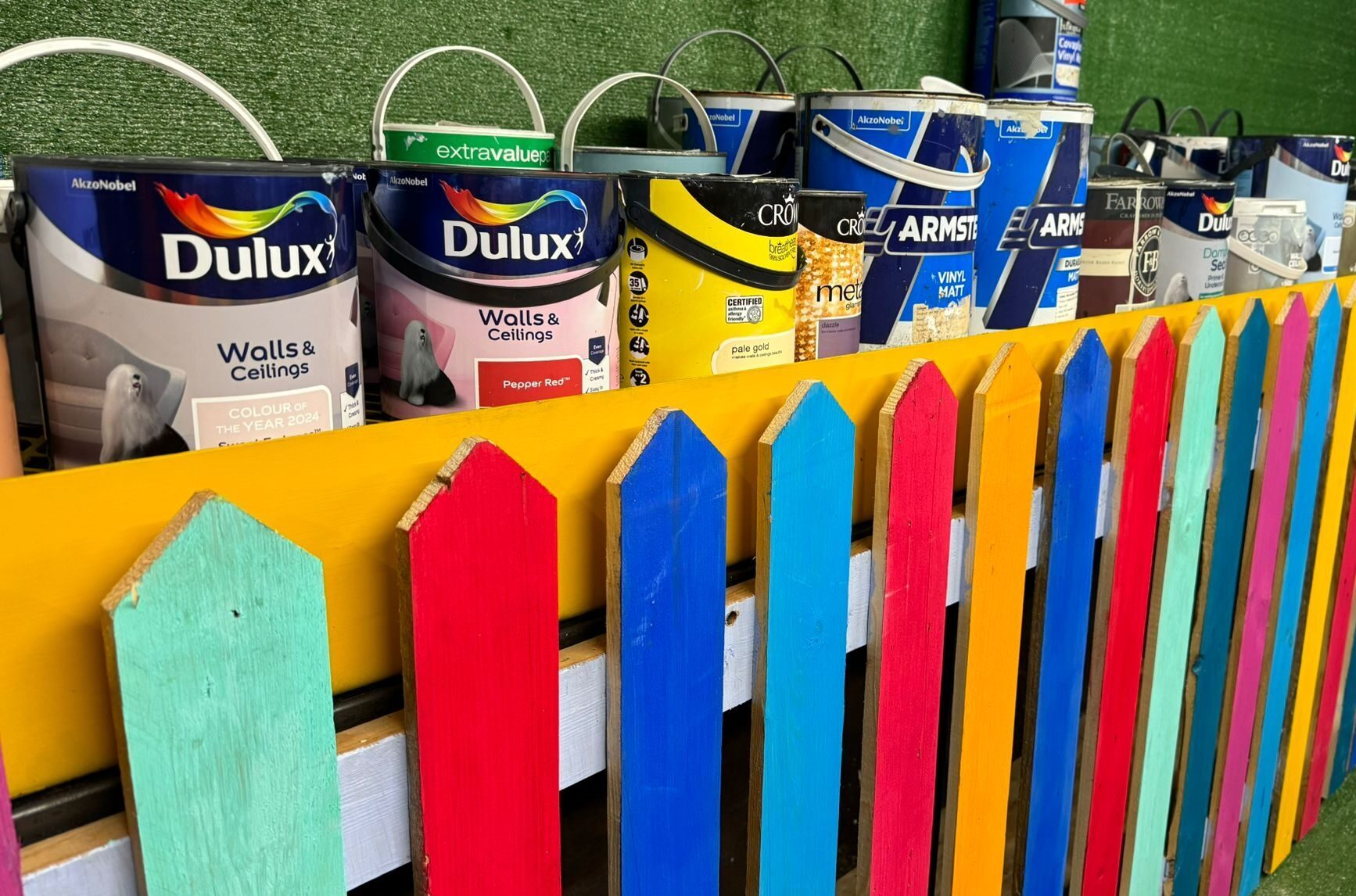
Pre-loved water based paint is now available to purchase in a new paint pod at the Arkwright Street Renew shop.
MORE INFOGrants of up to £20,000 are on offer for projects across Greater Manchester pioneering innovative solutions to prevent waste and increase recycling.
In the last four years, the Recycle for Greater Manchester Community Fund has supported an incredible 89 projects with £880,000 of funding. Now in its fifth year, the scheme is back a new name: the Renew Community Fund.
With the new name comes a refreshed purpose. The fund is looking for projects that can help bring the Renew principles to communities across Greater Manchester.
Two different award categories for the fund are available:
All community, voluntary and faith groups, schools, colleges, universities, charities and other non-profit organisations are eligible to apply. Applications open at 12pm on Tuesday 22 April on the Renew Community Fund website, and close at 12pm on Friday 30 May.
Cllr Tom Ross, Greater Manchester lead for Waste and Recycling, said: “The Renew Community Fund aims to increase the number of projects providing repair and sharing services to make it easier to get your items repaired or to buy something second hand
“When we fix something, borrow something instead of buying it, or buy second hand instead of new, we’re keeping these items in use and saving precious resources. SUEZ has achieved this on an industrial scale at the Renew Hub and in doing so has raised £880,000 that has gone back into local communities.”
Like the Renew Hub in Trafford Park operated by SUEZ recycling and recovery UK projects should focus on activities that help to make fixing, donating, sharing, borrowing and buying pre-loved or second-hand items a normal part of everyday life.
Projects that have been awarded funding in previous years include the Manchester Library of Things in Levenshulme, where residents can borrow most types of power tools and household equipment rather than buying their own.
Other projects set up include bike repair, laptop repair, repair cafés, and school uniform redistribution services – which enable families to share school uniform to families in need. These projects are far-reaching, not only helping to reduce the amount of waste thrown away, but they also provide support for families in need, by giving them access to affordable bikes, laptops and clothes.
Claire Williams, Renew Manager from SUEZ, said: “We are proud that the Renew Community Fund will continue to support repair and reuse projects in the local community. The benefits are significant, not only in reducing what we throw away but providing more affordable household items for families and offering the opportunity to learn new repair skills and bring the community together. I’m looking forward to seeing the innovative projects applying for this year’s fund. Our vision is to see a repair café or sharing service like the library of things on every high street.”
A blog by our friends at Stitched Up
We’ve launched a brand new Repair Café! The Boggart Hole Clough Repair Café is a collaboration between Stitched Up, the In Our Nature Programme and Lakeside CIC to bring the right to repair to the community of Blackley. Come to the Lakeside Café between 10-12, have a brew, and enjoy the beautiful view of the lake.
The first Repair Café was in Amsterdam in 2009, and now there are over 2,500 running worldwide. Volunteers are really the star of the show at Repair Cafés, so here’s 5 reasons why it’s awesome to volunteer at a Repair Café.
1. It saves money
Repair Cafés are run by volunteers, who love repairing and keeping items in use for longer. Instead of buying a new item to replace something broken, helping people mend their stuff for free saves a tonne of money. With the ongoing cost of living crisis, it’s more important than ever that our money goes as far as possible. By volunteering at a Repair Café, you can directly help your community save money.

2. Opportunity to skill share and learn skills
At a Repair Cafe, people might bring broken electronics, textiles, homewares or even bikes. With the knowledge of our volunteers, they will learn to fix these items so they can remain in circulation for longer. You don’t need to be an expert to volunteer! If you know how to sew on a button, or how to tighten a screw, Repair Cafes would really benefit from your time and skills. The great thing about the skill sharing aspect of Repair Cafes is that everyone’s knowledge is collectivised for the greater good. Plus, you’ll likely learn new skills from fellow volunteers which you can take forward in your own life.
3. Play a part in your community
Volunteering with people in your community has a profoundly positive impact on one’s own wellbeing, as well as helping out others. The National Council for Voluntary Organisations (NCVO) published a report on volunteering, where they found that nine out of ten volunteers said they had met friends through volunteering. Similarly, around two thirds of volunteers agreed that volunteering made them feel less isolated. Playing a part in your community through volunteering is fantastic for both your wellbeing, and that of other participants.
4. It’s cool to see inside broken objects
This one is best explained by a photo. Look at how cool this hedge trimmer looks when you get to see its cross section! There’s always something interesting to look at and get involved in at a Repair Cafe, and no two months will be the same!
5. Make a positive environmental impact
When an item is broken, it can be hard to dispose of sustainably. Charity shops can’t take broken things, and many items have a number of different materials that are hard to separate and recycle.
Repairing items means that the embodied resources that went into that item are not wasted. Every item repaired makes a difference. For example, by keeping your clothing for an extra nine months, instead of buying new, you reduce their environmental impact by 20-30%. Also, encouraging a new attitude to broken things through Repair Cafes helps your community act more sustainably.
How to volunteer
Get in touch with Boggart Hole Clough repair café:
Email: hello@stitchedup.coop
Phone: 0161 881 7141
Ask your local repair café if they need volunteers. Find your local on the repair directory

Residents in nine Greater Manchester boroughs can now recycle household plastics like pots, tubs and trays in their mixed recycling bin, previously only plastic bottles could be recycled at home. Upgrades at Greater Manchester’s materials recovery facility (MRF), where mixed recycling is sorted, has enabled this expansion Greater Manchester Combined Authority (GMCA) is also building a new, state-of-the-art MRF that will use advanced sorting technologies and AI, to be completed in the next 3 years.
Residents in Bury, Bolton, Manchester, Oldham, Rochdale, Salford, Stockport, Tameside and Trafford will now be able to recycle a wider range of plastic items in their household mixed recycling bin, thanks to upgrades in Greater Manchester’s recycling facilities and to the recent contract extension with SUEZ recycling and recovery UK
This week marks National Recycle Week which is focussed on rescuing items that can be recycled, so we are excited to announce that from today, 14 October, residents in those boroughs will now be able to recycle clean plastic items like:
Plastic pots (e.g. yoghurt, soup, cosmetics etc)
Plastic tubs (e.g. margarine, laundry powder, chocolates etc)
Plastic trays including black plastic trays (e.g. raw and cooked meat, fruit and veg punnets etc)
These items can now be put in the mixed recycling bin, alongside:
Plastic bottles (e.g. milk, pop, bleach, cleaning products, trigger sprays, shampoo)
Glass bottles and jars
Food tins and drinks cans
Aerosols
Foil
Plastic films like crisp packets, bread bags, pet food pouches and carrier bags, still cannot be recycled. People can throw plastic films into their household bin, where they’ll be burned to generate electricity for the region. However, we are planning to collect these types of plastic for recycling in the future once the new MRF is operational. Hard plastics like garden furniture or children’s toys can be taken to any Recycling Site in Greater Manchester.
Cllr Tom Ross, Portfolio Lead for Waste and Recycling, said: “Signing the biggest waste management contract in Europe with SUEZ has given us the stability and confidence to invest in our recycling facilities. We’re already in the top five authorities in the UK for recycling rates and this will help us to continue leading the way.
“With the Government’s Simpler Recycling Policy on the horizon, we have taken swift action to prepare for the coming changes, to ensure we’ll be compliant when the new rules come in.
“These upgrades will keep up our momentum on recycling, giving us time to build our new, cutting-edge materials recovery centre in Manchester while supporting residents to recycle more easily.”
Daniel Carolan, Contract Director for SUEZ in Greater Manchester, said: “We are pleased that through our recent contract extension with Greater Manchester Combined Authority, investment in the recycling facilities has enabled the introduction of plastic pots, tubs and trays. We know this announcement will be warmly welcomed by residents across Greater Manchester.
“This investment gives residents more options to recycle, helps protect the planet and reduces our carbon footprint. Working with GMCA, this is just one of the many improvements we’ve made to waste services in Greater Manchester in recent years, including increased recycling rates, a near-zero landfill rate, and an innovative reuse project at the Greater Manchester Renew Hub.”
Recycle for Greater Manchester is working with Recycle Your Electricals to encourage local residents to participate in The Great Cable Challenge – a nationwide campaign aimed at tackling the millions of cables sitting idle across UK households. The initiative is part of this year’s International E-Waste Day which is taking place on the 14th October.
With over one third of respondents (37%) checking for unused electricals less than once a year, the challenge aims to give a second life to the valuable materials contained in cables, such as copper. Copper can be recycled into new items such as wind turbines and new tech such as mobile phones, laptops, tablets, smart watches.
In Greater Manchester you can take all unwanted technology to all of our Household Waste Recycling Centres.
Things like cables, chargers, small electricals, phones, laptops, batteries and even vapes have designated recycling facilities.
The Great Cable Challenge comes as new research commissioned by Recycle Your Electricals reveals that two-in-five UK homes (39%) keep hold of their small electricals in a ‘drawer of doom’ – our secret, often hidden stashes of unused electricals and broken tech found in many households.[3] In fact, over a quarter of these respondents (28%) said they even felt embarrassed, annoyed or frustrated by the small electricals they store in their homes.[4]
The good news is that it’s now easier than ever to recycle unused cables and electricals using Recycle Your Electricals’ Recycling Locator. Just enter your postcode to find your nearest recycling point which has over 26,000 locations across the UK.
With millions of cables cluttering up UK homes, Recycle Your Electricals have published a handy Cable Guide. With 35 of the most used cables, the guide provides easy to use visuals to match cables to their original electricals. If the electricals or the cables are no longer working or they aren’t needed anymore, simply bag up your cables and recycle them! You can view the Cable Guide HERE.
Recycling electricals has never been easier as there are over 26,000 recycling points around the UK. Just check Recycle Your Electricals postcode locator to find your nearest recycling point – anything with a plug, battery or cable can be recycled.
International E-Waste Day (IEWD) 2024 aims to encourage householders to participate in this year’s campaign by encouraging everyone to recycle their cables and their household electricals.
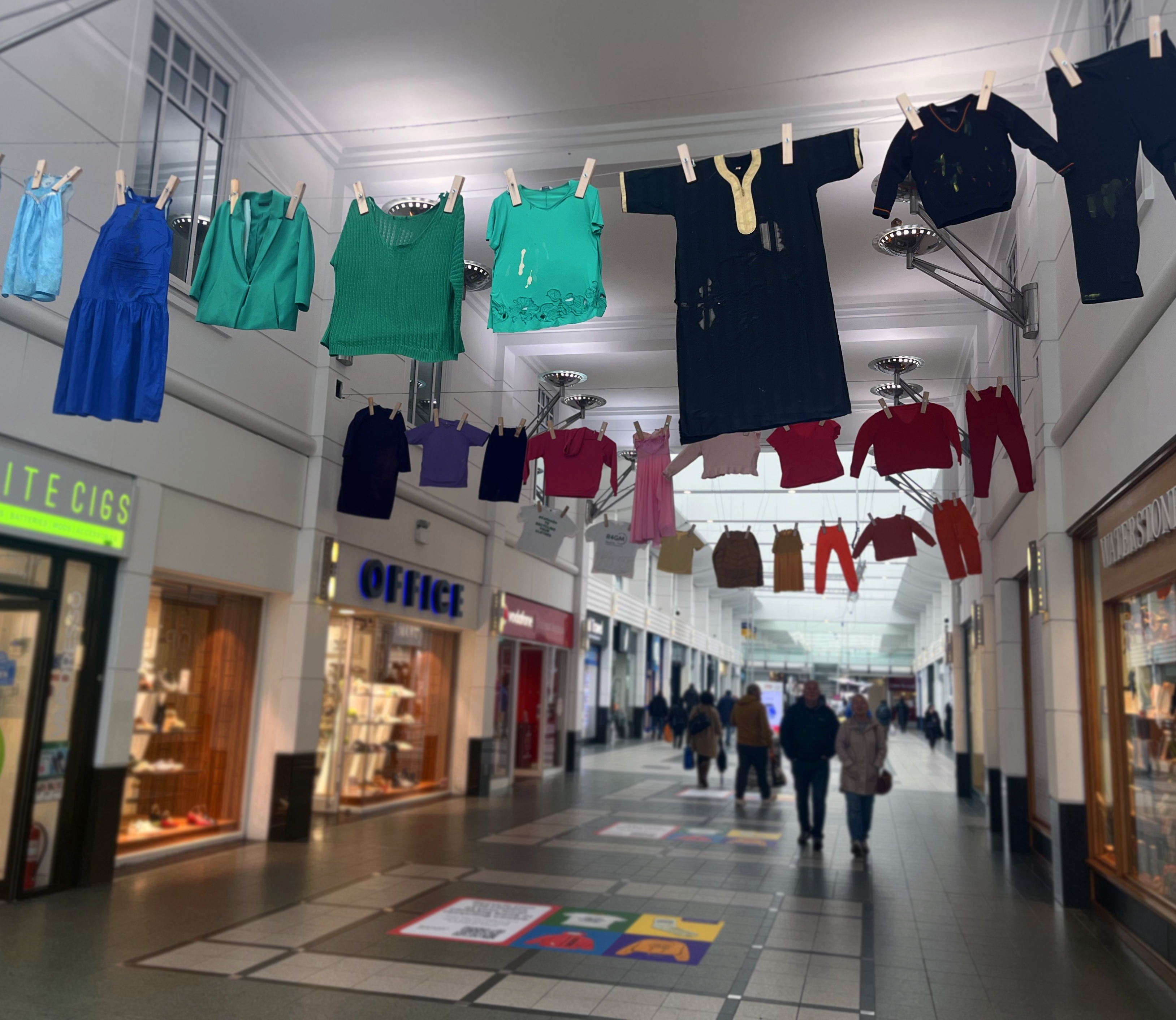 An immersive and eye-catching display has taken over a town centre’s shopping centre to encourage residents to think about how they get rid of their unwanted clothes.
An immersive and eye-catching display has taken over a town centre’s shopping centre to encourage residents to think about how they get rid of their unwanted clothes.
Each year thousands of tonnes of textiles are thrown away in Greater Manchester, with 16,700 tonnes put in general waste bins in 2023/24. On average each person in the UK throws away 35 items of clothing in the general waste bin every year, from socks with holes in to ripped or baggy t-shirts. Much of this also comes from ‘fast fashion’ with poor quality clothes sold cheaply before being quickly thrown away.
However, damaged clothes and shoes can be recycled, with residents being encouraged to donate their damaged or unwanted clothes and shoes to textile banks across Greater Manchester as part of the #CottonOn campaign.
R4GM has taken this campaign to Stockport town centre with an immersive installation at Merseyway shopping centre.
The installation shows unwearable clothes covered with imperfections from stains to rips and key messages about recycling. In addition to the installation there is outdoor advertising across Greater Manchester.
There are textile banks across Greater Manchester – including at all 20 of R4GM’s recycling centres – while many can also be found in supermarket carparks and large clothing stores. To find your nearest – Recycling Locator tool | Recycle Now
All clothes from our textile banks are hand sorted in Greater Manchester. Clothing that can’t be re-worn is recycled into something new like animal bedding, carpet underlay and even car seats, right here in the UK.
Cllr Tom Ross, GMCA’s lead for Waste and Recycling, said: “It is great to see this eye-opening display in busy hub of Stockport where residents can learn about an issue, they may not have been aware of. Throwing away clothes and shoes wastes valuable resources, especially considering the production of clothing and footwear requires significant amounts of energy, water, and raw materials.”
“This is another fantastic example of what Recycle for Greater Manchester does to highlight easy changes that people can make to recycle more and help improve our environment.”
The display will be at Merseyway from September 30 to October 11